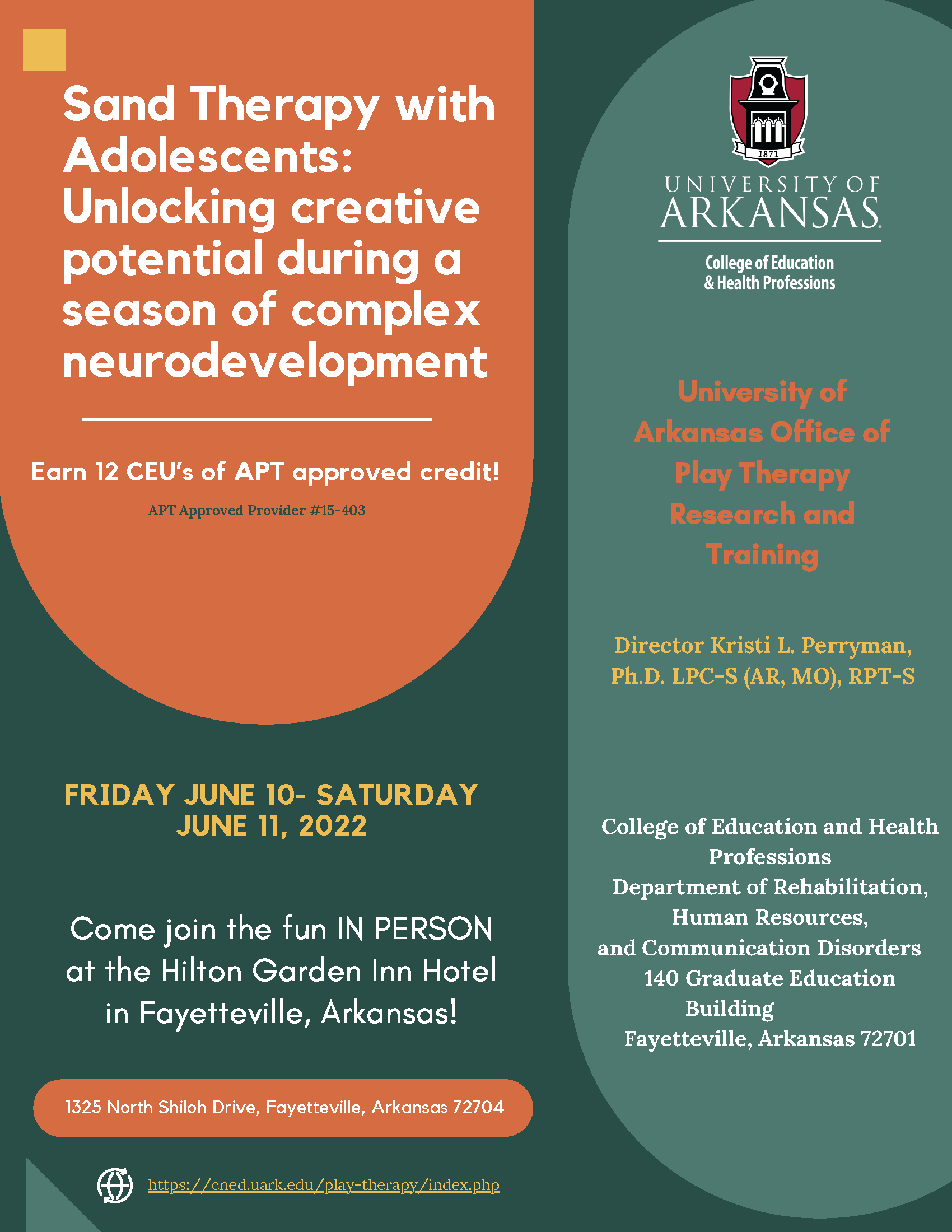Play Therapy Conference 2022
The University of Arkansas Office of Play Therapy Research & Training presents
Sand Therapy with Adolescents:
Unlocking Creative Potential
During a Season of Complex Neurodevelopment
Eighth Annual Play Therapy Conference
Presented by Marshall Lyles, LPC-S, LMFT-S, RPT-S
— in person at the Hilton Garden Inn in Fayetteville
Friday-Saturday, June 10-11, 2022
12 CEUs (Continuing Education Units) Approved Credit Available
☞ Online Registration ☜ (link to form disabled)
Fee
Early Bird, before 5p.m. Central March 14
- Professionals — $225
- Students — $150
Later — Professionals after March 14 — $250
Cancellations — A refund for the full amount less $15 administrative fee will be given for cancellations made at least two weeks prior to the event. No refunds will be given for cancellations made two weeks or less prior to the event. To cancel your registration and request a refund, please email: klperry@uark.edu
Brochure (PDF)

Program Description
Adolescence is a season of intense neurobiological change, which brings a mix of beautiful and painful complexities into teens’ lived experiences. Understanding the internal workings of the adolescent mind will support sandtray focused play therapists as they hold compassionate and resonant space for the evolving asymmetrical areas of development.
In this workshop, therapists will apply their unfolding awareness of the adolescent mind to focused play therapy using the sand tray. There will ample time for practicing in the sand tray as well as practicing the layering of other adolescent friendly expressive arts with sandtray based play therapy.
Learning Objectives
As a result of attending this workshop, participants will be able to:
- Describe the history of sandtray-based play therapy
- Discuss the neurobiology of the adolescent mind and its relevance to expressive play therapy
- Apply historical understanding of sandtray-based play therapy to work with adolescents
- Discuss sandtray-based play therapy material adaptations that may be needed for adolescent work
- Create sandtray-based play therapy treatment plans for varying adolescent presentations
- Apply advanced sandtray-based play therapy processing skills with adolescent clients
- Describe the complexity and impact of therapeutic resonance with an adolescent in sandtray-based play therapy
- Discuss the person of the play therapist awareness necessities for effective work with adolescent
Marshall Lyles, LPC-S, LMFT-S, RPT-S
Marshall Lyles, LPC-S, LMFT-S, RPT-S, lives in the Austin, Texas, area and has 20 years of practice in family and play therapy. Drawing on lessons learned from working with attachment trauma in a variety of mental health settings, Marshall regularly teaches on trauma, expressive therapies, and attachment-informed family work around the globe. In addition to maintaining a small clinical practice, Marshall also conducts supervision and consultation sessions with counseling professionals who are pursuing EMDR certification and RPT status, often with a particular focus on the use of sandtray therapy.
Marshall has published in professional journals and magazines in addition to contributing to the books Counseling Families: Play-Based Treatment and EMDR with Children in the Play Therapy Room: An Integrated Approach. Marshall has also co-authored a book titled Advanced Sandtray Therapy with Linda Homeyer and teaches in the Interpersonal Neurobiology Certificate Program at Portland Community College.
For more information, please contact
Kristi L. Perryman, Ph.D., LPC-S (AR, MO), RPT-S
Associate Professor, Counselor Education
klperry@uark.edu
Counselor Education and Supervision Program
Department of Rehabilitation, Human Resources and Communication Disorders
University of Arkansas
The U of A Counselor Education and Supervision Program is an Approved Provider of the Assocation for Play Therapy (APT) No. 15-403.
References
Adlem, A. (2017). The psycho social impact of sexual abuse on adolescents: Findings from a narrative sand play process. Child Abuse Research in South Africa, 18(2), 1 20.
Armstrong, S. A., Foster, R. D., Brown, T., & Davis, J. (2016). Humanistic Sandtray Therapy With Children and Adults. Directive Play Therapy: Theories and Techniques.
Badenoch, B. (2008). Being a Brain Wise Therapist: A Practical Guide to Interpersonal Neurobiology (Norton Series on Interpersonal Neurobiology). WW Norton & Company.
Draper, K., Ritter, K. B., & Willingham, E. U. (2003). Sand tray group counseling with adolescents. Journal for Specialists in Group Work, 28(3), 244 260.
Garrett, M. (2014). Beyond play therapy: Using the sandtray as an expressive arts intervention in counselling adult clients. Asia Pacific Journal of Counselling and Psychotherapy, 5(1), 99 105. https://doi.org/10.1080/21507686.2013.864319
Homeyer, L. & Lyles, M. (2022). Advanced sandtray therapy: Digging deeper into clinical practice. Routledge.
Homeyer, L. & Sweeney, D. (2017). Sandtray therapy: A practical manual. Self Esteem Shop.
Kestly, T. (2005). Adolescent sand tray therapy. Play Therapy with Adolescents, 18 29.
Kosanke, G., Puls, B., Feather, J., & Smith, J. (2016). Minimizing intense relational dynamics to enhance safety: A thematic analysis of literature on sandtray work with adult trauma survivors. British Journal of Psychotherapy, 32(4), 502 516. https://doi.org/10.1111/bjp.12242
Lakoff, G. (2014). Mapping the brain’s metaphor circuitry: Metaphorical thought in everyday reason. Frontiers in Human Neuroscience, 8. https://doi.org/10.3389/fnhum.2014.00958
Lowenfeld, M. (1979) Understanding children’s sandplay: Lowenfeld’s world technique. George Allen & Unwin.
Malchiodi, C.A. (Ed.). (2006). Expressive therapies. The Guilford Press.
Ogden, P., Minton, K., & Pain, C. (2006). Trauma and the body: A sensorimotor approach to psychotherapy (Norton series on interpersonal neurobiology). WW Norton & Company.
Perryman, K., Blisard, P., & Moss, R. (2019). Using creative arts in trauma therapy: The neuroscience of healing. Journal of Mental Health Counseling, 41(1), 80 94.
Roaten, G. K. (2011). Innovative and brain friendly strategies for building a therapeutic alliance with adolescents. Journal of Creativity in Mental Health, 6(4), 298 314.
Siegel, D. J. (2016). Mind: A journey to the heart of being human. WW Norton & Company.
